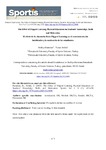The Effect of Flipped Learning Physical Education on Students' Knowledge, Skills and Motivation

Use este enlace para citar
http://hdl.handle.net/2183/33051
A non ser que se indique outra cousa, a licenza do ítem descríbese como Attribution-NonCommercial-ShareAlike 4.0 International (CC BY-NC-SA 4.0)
Coleccións
Metadatos
Mostrar o rexistro completo do ítemTítulo
The Effect of Flipped Learning Physical Education on Students' Knowledge, Skills and MotivationTítulo(s) alternativo(s)
El efecto de la educación física Flipped Learning en el conocimiento, las habilidades y la motivación de los estudiantesData
2023-05-01Cita bibliográfica
Karaman, B.; Arslan, Y. (2023). The Effect of Flipped Learning Physical Education on Students' Knowledge, Skills and Motivation. Sportis Sci J, 9 (2), 413-438
https://doi.org/10.17979/sportis.2023.9.2.9494
Resumo
[Resumen] Parece inevitable que la tecnología en desarrollo se integre en el campo de la educación. La aplicación de Flipped Learning (FL) , que incluye un componente tecnológico, a la educación física nos permitirá comprender mejor los reflejos del enfoque en el curso. El objetivo de este estudio es examinar el efecto de FL en el conocimiento, la motivación y el desarrollo de habilidades de los estudiantes en educación física. Se utilizó un diseño de grupo de control apareado pretest-postest. Los participantes, cuya media de edad es 14,5±1,0, son 62 estudiantes de secundaria que acaban de comenzar su escuela, incluidos 32 experimentales (11 niños, 21 niñas), 30 de control (10 niños, 20 niñas). De acuerdo con los hallazgos, la FL utilizada en educación física incrementó el conocimiento (Z= -4.18, p= .00) y la motivación de los estudiantes (λ de Wilks= .16, F(1, 60)= 55.60, p= .00, η2 = .83). Por otro lado, el desarrollo de la habilidad en voleibol tuvo un efecto solo en la habilidad técnica de pase (M= 3.00, Sd= 1.07; p< .05). En conclusión, este estudio proporciona alguna evidencia de que FL es un factor importante que influye en el conocimiento del contenido de voleibol de los estudiantes en educación física y puede ayudar a motivarlos a participar en clase. Se necesitan más estudios para probar el efecto de FL en el desarrollo de habilidades en educación física. [Abstract] It seems inevitable that the developing technology will be integrated into the field of education. The application of Flipped Learning (FL), which includes a technology component, in physical education will enable us to better understand the reflections of the approach on the lesson. The purpose of this study was to examine the effectiveness of the FL on students’ knowledge, motivation and skill development in physical education. A pretest-posttest matched control group design was used. The participants, whose mean age is 14.5±1.0, consists of 62 high school students who have just started their school, including 32
experimental (11 boys, 21 girls), 30 control (10 boys, 20 girls ). The FL, which was used in physical education, increased students' knowledge (Z= -4.18, p= .00) and motivation (Wilks'
λ= .16, F(1, 60)= 55.60, p= .00, η2= .83) , according to the findings . It only had an impact on the passing technical skill of the volleyball, which was utilized to assess skill development
(M= 3.00, Sd= 1.07; p< .05) . As a result, this study offers some evidence that the FL is an important factor affecting students' volleyball content knowledge in physical education and can help to motivate them to participate the lesson. Further studies are needed to test the effect of the FL on skill development in physical education.
Palabras chave
Flipped classroom
Pedagogy
Motivation
Volleyball skills
Volleyball content knowledge
Aula invertida
Pedagogía
Motivación
Habilidades de voleibol
Conocimiento del contenido de voleibol
Pedagogy
Motivation
Volleyball skills
Volleyball content knowledge
Aula invertida
Pedagogía
Motivación
Habilidades de voleibol
Conocimiento del contenido de voleibol
Versión do editor
Dereitos
Attribution-NonCommercial-ShareAlike 4.0 International (CC BY-NC-SA 4.0)






